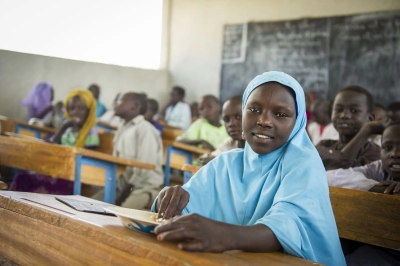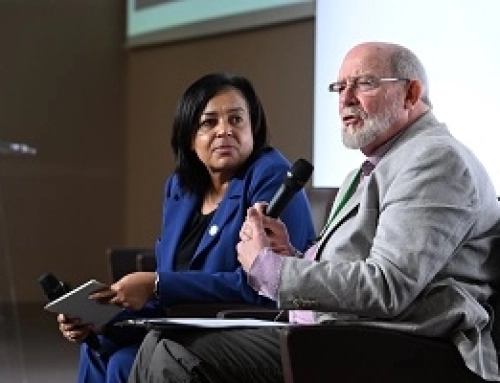
The 15 ECOWAS countries are making progress in their national homegrown school feeding programmes, ensuring that girls remain in school and improving their learning. The bulk of the countries have since joined the School Meals Coalition in the last two years, demonstrating commitment to ensuring all children in all ECOWAS countries eat a nutritious meal at school by 2030. © WFP Regional Bureau for West and Central Africa.
The Economic Community of West African States (ECOWAS) hosted a three-day Technical Stocktaking Conference on homegrown school feeding programmes from 21 – 23 May 2024 in Dakar, Senegal. Delegates from all ECOWAS and non-ECOWAS member states (Central African Republic, Chad, and Mauritania) from government ministries including education and agriculture shared their programme priorities and financing mechanisms. Other participants included International Financial Institutions (IFIs), the School Meals Coalition, non-governmental organisations, research institutions and UN Agencies. ECOWAS announced national commitments submitted to the School Meals Coalition by seven countries. The commitments outline specific plans and objectives each country will pursue to provide nutritious school meals. Currently, 14 of the 15 ECOWAS countries have joined the School Meals Coalition, demonstrating collective commitment to extend school meals.
Two new publications on the role of International Financial Institutions and other financing mechanisms on advancing homegrown school feeding programmes and an ECOWAS Homegrown School Feeding landscape analysis paper were presented to stimulate further discussions. The meeting builds up on last year’s discussions at the ECOWAS Regional Technical Conference on homegrown school feeding in Dakar, and the School Meals Coalition First Global Summit in Paris, which underscored the importance of innovative financing to help expand investment to scale up quality school meal programmes globally. At the Africa Day of School Feeding in Burundi earlier this year, governments demonstrated strong commitment towards extending coverage of school meals in Africa, where 65.9 million children are receiving meals.
High-level government representatives agreed on the need to continue improving domestic financing and expanding partnerships for innovative financing. In the upcoming ECOWAS conference, discussions will mainly focus on the financing of costed commitments to homegrown school feeding.
The conference included a half- day session on financing, to hear and learn from IFIs, donors, and innovative and sustainable financing initiatives. Discussions will address evidence gaps and ensure effective alignment of national commitments to school meals with available financing opportunities.
Presentations showcased showcase best practices and propose institutional models for homegrown school feeding initiatives through sharing successful experiences and innovative approaches. Following last year’s ECOWAS conference, there has been significant interest expressed by partners for peer-to-peer learning and strengthening of a collective regional commitment. The exchange in the upcoming meeting will help to inspire the adoption of effective strategies and ensure progress across all ECOWAS member states.

